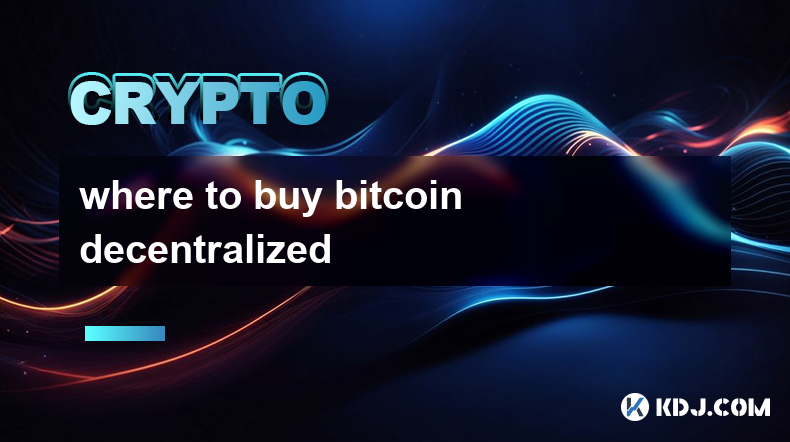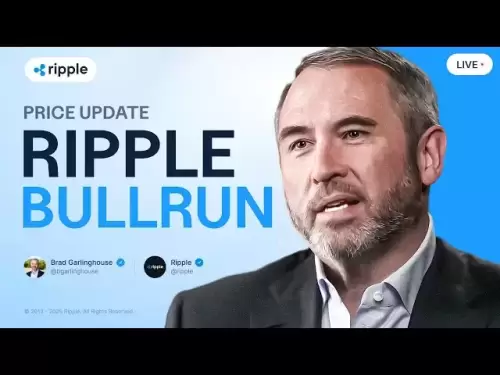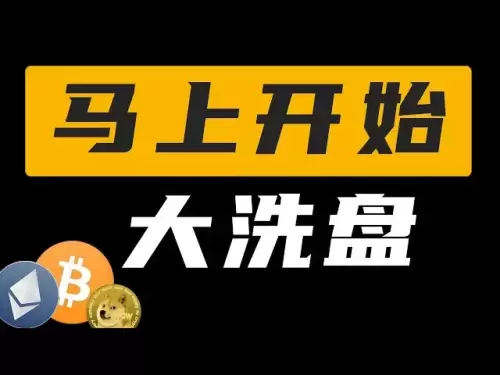-
 Bitcoin
Bitcoin $105,426.8455
1.10% -
 Ethereum
Ethereum $2,519.1985
4.54% -
 Tether USDt
Tether USDt $0.9998
-0.06% -
 XRP
XRP $2.3796
-0.02% -
 BNB
BNB $649.0691
0.90% -
 Solana
Solana $166.5150
-0.77% -
 USDC
USDC $0.9996
-0.03% -
 Dogecoin
Dogecoin $0.2241
-0.02% -
 Cardano
Cardano $0.7420
0.30% -
 TRON
TRON $0.2657
-0.03% -
 Sui
Sui $3.8141
0.52% -
 Chainlink
Chainlink $15.7718
2.24% -
 Avalanche
Avalanche $22.1791
-0.82% -
 Stellar
Stellar $0.2864
-0.34% -
 Hyperliquid
Hyperliquid $26.4576
0.74% -
 Shiba Inu
Shiba Inu $0.0...01456
0.37% -
 Hedera
Hedera $0.1927
0.63% -
 UNUS SED LEO
UNUS SED LEO $8.6862
0.11% -
 Bitcoin Cash
Bitcoin Cash $391.9525
-1.60% -
 Toncoin
Toncoin $3.0205
-2.62% -
 Litecoin
Litecoin $98.8104
0.36% -
 Polkadot
Polkadot $4.5956
-0.99% -
 Monero
Monero $342.3976
1.45% -
 Bitget Token
Bitget Token $5.1873
1.64% -
 Pepe
Pepe $0.0...01323
1.38% -
 Dai
Dai $0.9999
0.00% -
 Pi
Pi $0.7376
0.48% -
 Ethena USDe
Ethena USDe $1.0003
-0.04% -
 Uniswap
Uniswap $5.9557
1.27% -
 Aave
Aave $240.9477
7.21%
where to buy bitcoin decentralized
Decentralized exchanges provide a secure and private way to acquire Bitcoin, offering benefits like lower fees, enhanced privacy, and user control over funds compared to centralized exchanges.
Jan 31, 2025 at 04:19 am

Key Points:
- Understanding Decentralized Cryptocurrency Exchanges (DEXs)
- Benefits of Buying Bitcoin on Decentralized Exchanges
- Popular Decentralized Exchanges for Bitcoin Trading
- How to Choose a Decentralized Exchange for Bitcoin Purchases
- Risks Associated with Decentralized Exchanges
Content:
1. Understanding Decentralized Cryptocurrency Exchanges (DEXs)
Decentralized exchanges (DEXs) revolutionize the way cryptocurrencies are traded by eliminating the need for intermediaries like centralized exchanges. In DEXs, users connect directly with each other through a decentralized network, enabling peer-to-peer (P2P) transactions without relying on a trusted third party.
Unlike centralized exchanges that hold users' assets in escrow, DEXs provide custody over funds to users, offering greater security and control over private keys. Transactions are executed automatically through smart contracts, ensuring transparency and immutability.
2. Benefits of Buying Bitcoin on Decentralized Exchanges
- Enhanced Security: No centralized entity holds custody of funds, reducing the risk of hacks or theft.
- Increased Privacy: Users remain anonymous, as DEXs don't require user identification or personal information.
- Lower Fees: DEXs often offer lower fees compared to centralized exchanges, as they eliminate the need for middlemen.
- Decentralization: DEXs promote the principles of decentralization by giving users full control over their assets.
- Transparency: All transactions on DEXs are publicly recorded on the blockchain, fostering transparency and accountability.
3. Popular Decentralized Exchanges for Bitcoin Trading
- Uniswap: Leading decentralized exchange known for its liquidity and support for a wide range of tokens, including Bitcoin.
- SushiSwap: Fork of Uniswap with additional features, such as yield farming and token governance.
- PancakeSwap: DEX primarily focused on the Binance Smart Chain, offering a wide selection of tokens and low fees.
- 1inch: Aggregator DEX that searches for the most favorable exchange rates across multiple liquidity pools, optimizing trade execution.
- KyberSwap: Decentralized exchange platform with a focus on providing instant liquidity for token swaps.
4. How to Choose a Decentralized Exchange for Bitcoin Purchases
- Security Measures: Consider the exchange's reputation, security audits, and insurance coverage to ensure the protection of user funds.
- Transaction Fees: Compare the fees associated with different DEXs to optimize trading costs.
- Liquidity: Assess the availability and liquidity of Bitcoin on the chosen exchange to avoid slippage and delays.
- User Interface: Evaluate the exchange's user-friendliness and functionality to determine the ease of use and navigation.
- Supported Cryptocurrencies: Ensure that the DEX supports Bitcoin and other desired cryptocurrencies for trading purposes.
5. Risks Associated with Decentralized Exchanges
- Smart Contract Vulnerability: DEXs rely on smart contracts, which can be susceptible to bugs or exploits, potentially leading to loss of funds.
- Market Volatility: Cryptocurrency markets are highly volatile, and DEXs may not offer the same level of price stability as centralized exchanges.
- Liquidity Constraints: DEXs may experience limited liquidity for certain tokens, resulting in higher slippage or difficulty finding counterparties.
- User Responsibility: Users are responsible for the safe storage of their private keys, as DEXs do not provide custodial services.
- Regulatory Uncertainties: DEXs operate in a constantly evolving regulatory landscape, which can pose challenges to their legality and accessibility.
FAQs:
- What advantages do decentralized exchanges have over centralized exchanges?
Decentralized exchanges offer enhanced security, privacy, lower fees, decentralization, and transparency. - Are decentralized exchanges safer than centralized exchanges?
DEXs reduce the risk of hacks and theft as users maintain custody of their funds. However, smart contract vulnerability remains a potential risk. - How can I choose a reliable decentralized exchange for Bitcoin trading?
Consider factors such as security measures, transaction fees, liquidity, user interface, and supported cryptocurrencies to select a reputable and suitable DEX. - What are the potential downsides of using decentralized exchanges?
DEXs may face issues with liquidity constraints, smart contract vulnerability, market volatility, user responsibility for private key management, and regulatory uncertainties. - What are the most popular decentralized exchanges for Bitcoin trading?
Popular DEXs for Bitcoin include Uniswap, SushiSwap, PancakeSwap, 1inch, and KyberSwap.
Disclaimer:info@kdj.com
The information provided is not trading advice. kdj.com does not assume any responsibility for any investments made based on the information provided in this article. Cryptocurrencies are highly volatile and it is highly recommended that you invest with caution after thorough research!
If you believe that the content used on this website infringes your copyright, please contact us immediately (info@kdj.com) and we will delete it promptly.
- Are you ready to ride the next wave of meme coin mania?
- 2025-05-20 06:25:13
- Bitcoin (BTC) price rebounds over 3 percent after breaking out of a symmetrical triangular pattern
- 2025-05-20 06:25:13
- JPMorgan Chase (JPM) Allows Clients to Purchase Bitcoin (BTC), CEO Jamie Dimon Remains a Skeptic
- 2025-05-20 06:20:14
- Opera MiniPay Stablecoin Wallet Expands to iOS, Opening Up New Markets
- 2025-05-20 06:20:14
- Ethereum (ETH) price sees correction, but analysts remain optimistic
- 2025-05-20 06:15:13
- Circle is exploring potential acquisitions, primarily by Coinbase, according to Fortune.
- 2025-05-20 06:15:13
Related knowledge

What is Ethereum’s Slashing mechanism and how to punish malicious behavior?
Feb 20,2025 at 03:08am
Key PointsOverview of slashingDifferent types of slashing in EthereumIncentives and consequences of slashingIdentifying and reporting slashed validatorsOngoing discussions and potential improvementsEthereum's Slashing Mechanism: Punishing Malicious BehaviorEthereum's slashing mechanism is an essential tool for ensuring network security and punishing mal...

What is the verifier node of Ethereum and how to become a verifier?
Feb 19,2025 at 06:00pm
The Verifier Node of Ethereum: A Comprehensive GuideKey Points:What is a Verifier Node?How to Become a Verifier NodeResponsibilities and Rewards of a Verifier NodeMinimum Requirements for Becoming a Verifier NodePotential Difficulties in Running a Verifier Node1. What is a Verifier Node?A Verifier Node is an independent entity on the Ethereum network th...

What is Ethereum’s staking, and how to participate and earn money?
Feb 19,2025 at 04:37pm
Key Points:Understanding Ethereum's Staking MechanismSteps to Participate in StakingBenefits and Rewards of StakingSecurity and Risk ConsiderationsTechnical Requirements and Hardware OptionsPotential Challenges and Troubleshooting TipsFAQs on Ethereum StakingWhat is Ethereum's Staking?Proof-of-Stake (PoS) is a consensus mechanism used in blockchain netw...

What is Ethereum’s DAO (Decentralized Autonomous Organization) and how does it work?
Feb 20,2025 at 03:12am
Key PointsDefinition and Structure of a DAOGovernance and Decision-Making in DAOsBenefits and Use Cases of DAOsChallenges and Limitations of DAOsWhat is Ethereum's DAO (Decentralized Autonomous Organization) and How Does It Work?Definition and Structure of a DAOA Decentralized Autonomous Organization (DAO) is an innovative governance and management fram...

What is Ethereum's multi-signature wallet and how to improve security?
Feb 20,2025 at 02:18pm
Key Points:Understanding the Concept of a Multi-Signature WalletBenefits and Drawbacks of Multisig WalletsRequirements for Setting Up a Multisig WalletStep-by-Step Guide to Generating a Multisig WalletImplementing Strategies for Enhanced Security1. Understanding the Concept of a Multi-Signature WalletA multi-signature (multisig) wallet in the Ethereum e...

What is Ethereum's oracle and how to provide data for smart contracts?
Feb 21,2025 at 01:30am
Key Points:Understanding the concept of oracles in EthereumExploring different types of oraclesDetailed guide on how to provide data for smart contractsAddressing potential challenges and considerationsWhat is Ethereum's Oracle?Oracles are crucial components in the Ethereum ecosystem, enabling smart contracts to access real-world data and off-chain even...

What is Ethereum’s Slashing mechanism and how to punish malicious behavior?
Feb 20,2025 at 03:08am
Key PointsOverview of slashingDifferent types of slashing in EthereumIncentives and consequences of slashingIdentifying and reporting slashed validatorsOngoing discussions and potential improvementsEthereum's Slashing Mechanism: Punishing Malicious BehaviorEthereum's slashing mechanism is an essential tool for ensuring network security and punishing mal...

What is the verifier node of Ethereum and how to become a verifier?
Feb 19,2025 at 06:00pm
The Verifier Node of Ethereum: A Comprehensive GuideKey Points:What is a Verifier Node?How to Become a Verifier NodeResponsibilities and Rewards of a Verifier NodeMinimum Requirements for Becoming a Verifier NodePotential Difficulties in Running a Verifier Node1. What is a Verifier Node?A Verifier Node is an independent entity on the Ethereum network th...

What is Ethereum’s staking, and how to participate and earn money?
Feb 19,2025 at 04:37pm
Key Points:Understanding Ethereum's Staking MechanismSteps to Participate in StakingBenefits and Rewards of StakingSecurity and Risk ConsiderationsTechnical Requirements and Hardware OptionsPotential Challenges and Troubleshooting TipsFAQs on Ethereum StakingWhat is Ethereum's Staking?Proof-of-Stake (PoS) is a consensus mechanism used in blockchain netw...

What is Ethereum’s DAO (Decentralized Autonomous Organization) and how does it work?
Feb 20,2025 at 03:12am
Key PointsDefinition and Structure of a DAOGovernance and Decision-Making in DAOsBenefits and Use Cases of DAOsChallenges and Limitations of DAOsWhat is Ethereum's DAO (Decentralized Autonomous Organization) and How Does It Work?Definition and Structure of a DAOA Decentralized Autonomous Organization (DAO) is an innovative governance and management fram...

What is Ethereum's multi-signature wallet and how to improve security?
Feb 20,2025 at 02:18pm
Key Points:Understanding the Concept of a Multi-Signature WalletBenefits and Drawbacks of Multisig WalletsRequirements for Setting Up a Multisig WalletStep-by-Step Guide to Generating a Multisig WalletImplementing Strategies for Enhanced Security1. Understanding the Concept of a Multi-Signature WalletA multi-signature (multisig) wallet in the Ethereum e...

What is Ethereum's oracle and how to provide data for smart contracts?
Feb 21,2025 at 01:30am
Key Points:Understanding the concept of oracles in EthereumExploring different types of oraclesDetailed guide on how to provide data for smart contractsAddressing potential challenges and considerationsWhat is Ethereum's Oracle?Oracles are crucial components in the Ethereum ecosystem, enabling smart contracts to access real-world data and off-chain even...
See all articles
























































































